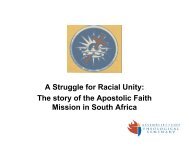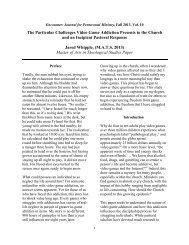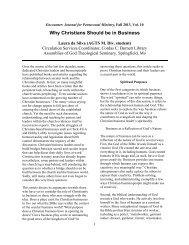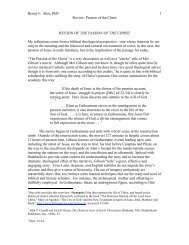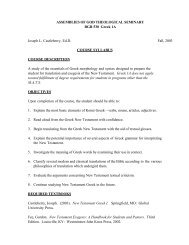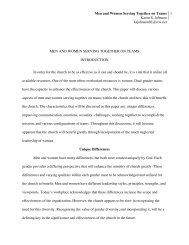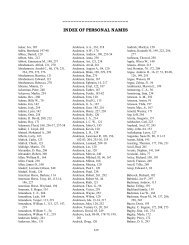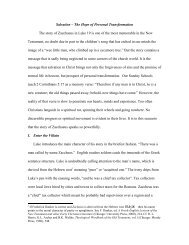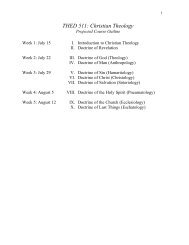Encounter: Journal for Pentecostal Ministry - Assemblies of God ...
Encounter: Journal for Pentecostal Ministry - Assemblies of God ...
Encounter: Journal for Pentecostal Ministry - Assemblies of God ...
You also want an ePaper? Increase the reach of your titles
YUMPU automatically turns print PDFs into web optimized ePapers that Google loves.
italics]. Eberhard Jüngel, Christ, Justice, and Peace: Toward a Theology <strong>of</strong> the State, in Dialogue with the Barmen<br />
Declaration, trans. D. Bruce Hamill and Alan J. Torrance (Edinburgh: T & T Clark, 1992), xix-xx.<br />
6 Richard J. Mouw, Political Evangelism (Grand Rapids, MI: Eerdmans, 1973), 55.<br />
7 Ratzinger, 204.<br />
8 Pietists fall short by reducing Jesus‟ message to that <strong>of</strong> <strong>for</strong>giveness <strong>of</strong> sins and personal salvation, while<br />
Brunner argues that the kingdom <strong>of</strong> <strong>God</strong> is totally beyond the limits <strong>of</strong> earth and time. Thus, it has nothing to do with<br />
our personal relationships in this life, the state, justice today, etc. Both <strong>of</strong> these understandings miss important facets<br />
<strong>of</strong> the Christian message <strong>of</strong> deliverance. See Emil Brunner, Justice and the Social Order, trans. Mary Hottinger<br />
(London: Lutterworth Press, 1945); and Ronald J. Sider, The Scandal <strong>of</strong> Evangelical Politics: Why Are Christians<br />
Missing the Chance to Really Change the World? (Grand Rapids, MI: Baker Books, 2008), 64-71.<br />
9 For an articulation <strong>of</strong> the legitimacy <strong>of</strong> <strong>for</strong>ming a political ethic on the teachings <strong>of</strong> the New Testament, see<br />
John Howard Yoder, The Politics <strong>of</strong> Jesus (Grand Rapids, MI: Eerdmans, 1994).<br />
10 Bruce Ellis Benson and Peter Goodwin Heltzel, eds. (Foreword by Nicholas Wolterstorff), Evangelicals and<br />
Empire: Christian Alternatives to the Political Status Quo (Grand Rapids, MI: Brazos Press, 2008), 9.<br />
11 Several things are in mind here. For instance, free market enterprise or global market fundamentalism has<br />
been increasingly given reign over the interests <strong>of</strong> the general public. Rampant deregulation that was originally put in<br />
place, not as a Democratic hoax <strong>for</strong> more „big government,‟ but rather to serve as a check on pr<strong>of</strong>it-driven<br />
corporations who are becoming more detached from the customers they are supposed to serve and with the purpose <strong>of</strong><br />
„speaking <strong>for</strong> the people.‟ The corporation then takes control <strong>of</strong> Washington, pays little attention to any harm they<br />
cause the environment or the consumer, and no one is left to blow the whistle. The domination/liberation model then<br />
leaves us with systems that are in many ways promoters <strong>of</strong> injustice while being lauded as the great synthesis <strong>of</strong> a<br />
Hegelian framework. Some <strong>of</strong> this will be further developed in the following section on Empire.<br />
12 The preemptive invasion <strong>of</strong> Iraq by the United States would have to be considered unjust by basically every<br />
set <strong>of</strong> written standards on “unjust war” theory. [Note: Author‟s opinion. AGTS holds no <strong>of</strong>ficial opinion on the justice<br />
or injustice <strong>of</strong> the Iraq War.] Also, it is hard to miss the brutal dehumanization <strong>of</strong> the prisoners at Guantanamo Bay<br />
once they are situated beyond the reach <strong>of</strong> all legal codes.<br />
13 Lester Edwin J. Ruiz and Charles W. Amjad-Ali describe the link theologically from Re<strong>for</strong>med traditions<br />
with their double-predestinarian theology producing extremely unjust polities. This occurs when groups lay claim to<br />
others‟ land, property, and labor as their own entitlements under the guise <strong>of</strong> the “blessings <strong>of</strong> <strong>God</strong>.” The theology<br />
dominates U.S. <strong>for</strong>eign policy at the moment: America is the righteous nation who has done nothing wrong and is<br />
preordained to a hegemonic status. The enemies on the other hand are totally wrong and immoral; they are<br />
ontologically inferior and preordained to a negative status because they stand against <strong>God</strong>‟s chosen—the United<br />
States. “This blissfully uncomplicated, simplistic, and misin<strong>for</strong>med understanding <strong>of</strong> self and „enemy‟ takes on<br />
interesting, if amusing, <strong>for</strong>ms. For example, the United States defines itself metaphorically as both David (because <strong>of</strong><br />
its righteousness and the justness <strong>of</strong> its cause) and Goliath (<strong>for</strong> who else but one specially blessed can have the power,<br />
strength, and armor that Goliath displayed?). Such schizophrenia is at times totally unbearable and <strong>for</strong> its victims an<br />
unmitigated disaster.” Charles W. Amjad-Ali, & Lester Edwin J. Ruiz, “Betrayed By a Kiss: Evangelicals and U. S.<br />
Empire,” in Evangelicals and Empire, ed. Bruce Ellis Benson and Peter Goodwin Heltzel (Grand Rapids, MI: Brazos<br />
Press, 2008), 57-8.<br />
14 Amos Yong, and Samuel Zalanga, “What Empire, Which Multitude? <strong>Pentecostal</strong>ism and Social Liberation<br />
in North America and Sub-Saharan Africa,” in Evangelicals and Empire, ed. Bruce Ellis Benson and Peter Goodwin<br />
Heltzel (Grand Rapids, MI: Brazos Press, 2008), 237.<br />
15 They further state that, “liberal democratic societies may think they are free, but they are not because<br />
capitalism turns their day-to-day life into a „social factory.‟” Yong and Zalanga, “What Empire, Which Multitude?”<br />
238-9.



